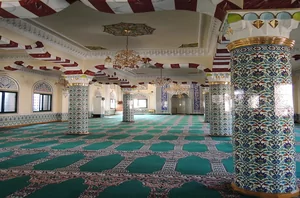The Virtues and Importance of Tahajjud
“The (true) servants of the Most Compassionate are those who walk on the earth humbly, and who, when the ignorant address them, they respond with words of peace, and those who spend the night before their Lord, prostrating and standing…” (25:63-4).
Tahajjud, also known as qiyām al-layl, is one of the greatest acts of worship a servant can perform. After the obligatory deeds, it is one of the most beloved deeds to Allah. The Prophet ﷺ would always pray tahajjud. He would not miss tahajjud even when travelling; and when he was ill, he would pray sitting down.
Tahajjud: The Path to Allah’s Love
Tahajjud is the believer’s honour: the believer stands at night in humility, and in return, Allah honours His servant and grants him a lofty status. It is the key to attaining Allah’s love and pleasure.
The Messenger of Allah ﷺ said, “There are three people whom Allah loves, is delighted with and smiles at…[Of them is] a man who has a beautiful wife, and a comfortable bed. He then gets up to pray (at night), so Allah says to His Angels, “My Angels, look! This is My servant. He has a comfortable bed and a beautiful wife, but he left them both. He then stood to pray, humbly begging Me, and reciting My verses. And if he wished, he could have slept…” (Ḥākim).
The Messenger of Allah ﷺ said, “Hold on tight to the night prayer. Indeed it is the habit of the righteous who came before you. It brings you close to your Lord, wipes away your sins, prevents you from sinning and repels sickness from the body” (Tirmidhī).
Tahajjud removes laziness, strengthens the body and illuminates the heart.
Tahajjud: Your Companion in the Hereafter
Tahajjud will intercede on behalf of the servant on the Day of Judgement.
The Qur’ān will say: ‘I prevented him from sleeping at night, so accept my intercession on his behalf’ (Aḥmad).
Ibn ʿAbbās (radiy Allāhu ʿanhumā) said, “Whoever wishes for Allah to make the lengthy standing on the Day of Judgment easy for him, let him show Allah his devotion in the darkness of the night— prostrating and standing in prayer, fearing the hereafter.”
Tahajjud will be a source of comfort and joy in the grave. Ibn Rajab (raḥimahullāh) said, “How many people who stood in prayer at night will rejoice due to their night prayers, in the darkness of their graves; and how many people who slept through the night will regret their long sleep. This will be when they see the honour Allah bestows upon the worshippers tomorrow. So, take advantage of the passing hours, nights, and days—may Allah have mercy on you.”
“Pray two rakʿahs in the darkness of the night for the darkness of the grave. Fast on a very hot day for the heat of the Day of Resurrection, and give charity to ward off the perils of a very difficult Day.” – Abū al-Dardā (raḍiy Allāhu ʿanhu)
Tahajjud: A Surprise Reward
From His immense kindness, Allah al-Barr (The Kind), has concealed a magnificent everlasting reward for His slaves who hid away from His creation, shunned their cosy blankets away, and turned to Him in the depths of the night.
He (subḥānahū wa taʿālā) says, “The only true believers in Our verses are those who—when they are reminded of them—fall into prostration and glorify the praises of their Lord, and are not too proud. Their sides shun their beds, praying to their Lord in fear and hope; and they spend (in charity) some of what We have given them. Not a single soul is aware of the blissful delight that has been reserved for them in secret, as a reward of what they used to do” (32:15-17).
Ḥasan al-Basrī (raḥimahullāh) said, “The people concealed their deeds, so Allah reserved for them in secret what no eye has seen and what has not crossed the mind of any human being.” Allah (subḥānahū wa taʿālā) says, “Indeed, the righteous will be in Gardens and springs, receiving what their Lord will grant them. Before this, they were truly good-doers: they used to sleep only little at night, and in the hours before dawn they used to pray for forgiveness. And in their wealth there was a rightful share fulfilled for the beggar and the poor.” (51:15-19).
The Messenger of Allah ﷺ said, “Indeed, in Paradise, there are rooms whose exterior can be seen from their interior, and their interior can be seen from their exterior.” A bedouin stood up and asked, “Who are they for, O Messenger of Allah?” He ﷺ replied, “They are for those who speak good, feed others, regularly fast, and pray at night whilst people are asleep” (Tirmidhī).
Tahajjud and the Sweetness of Worship
Tahajjud is one of the best provisions a believer can take in their journey to Allah. It brings a sweetness which is nearly impossible to experience otherwise. One of life’s greatest joys is being able to cry out to one’s Maker in the stillness of the night, in qiyām, and in sajdah, when one is closest to Him.
The most illuminating worship occurs in the darkness of the night. It is when the treasures of the heart unfold, and the heart connects fully to Allah. The night is when we unfurl our masks and let down our guard in the company of our Beloved Lord. We pour our hearts out to Him and shed tears for Him Alone.
Ibn Rajab (raḥimahullāh) writes, “There is nothing more delightful to the lovers than the moments of solitude in which they converse with their Beloved. It is the cure for their hearts and the ultimate goal they seek…Whoever does not share their longing and taste the sweetness of their intimate conversations—will not comprehend what makes them weep.”
By Allah, if it wasn’t for the night prayer (qiyām al-layl), I would not have loved the world. By Allah, the people of the night (prayer) experience more delight in their night than the people of entertainment experience in their entertainment. Sometimes the hearts experience moments in which they leap out of joy due to the remembrance of Allah, to the extent that I say: ‘If the people of Paradise have anything like this, then how blissful must their lives be!’ – Abū Sulaymān al-Dārānī (raḥimahullāh)
Tahajjud Strengthens Iman & Purifies the Soul
Tahajjud provides great spiritual and physical strength. Night prayer leaves a deep impression on the soul as it requires a person to fight their nafs and Shayṭān. When Allah (subḥānahū wa taʿālā) wanted to prepare the Prophet ﷺ for His weighty message, He chose for him night worship.
Allah (subḥānahū wa taʿālā) says, “O you wrapped up (in your clothes)! Stand at night (in prayer) except a little—half of it (night), or make it a little less, or make it a little more—and recite the Qur’ān slowly and distinctly. We will soon send down to you a weighty revelation. Indeed, worship in the night is more impactful and suitable for recitation” (73:1-6).
Similarly, tahajjud was made obligatory at the very beginning for the early Muslims. The Companions (radiy Allāhu ʿanhum) were commanded to spend the greater part of every night in prayer. This is because tahajjud is one of the most effective methods of nurturing and strengthening one’s īmān. Since the noble Companions were being tasked with a difficult mission, their hearts had to be imbued with īmān and guidance through tahajjud.
Praying tahajjud consistently during the nights purifies the soul and trains the nafs. By having a strict regimen, you are developing mastery over your nafs and this will—by Allah’s permission—lead to your soul being purified and your heart becoming illuminated.
“Five things cure the heart: reciting the Qur’ān with tadabbur (reflection), an empty stomach, the night prayer, humbly supplicating to Allah (ʿazza wa jall) before dawn, and keeping the company of the righteous.” – Ibrāhīm al-Khawwāṣ (raḥimahullāh)
Tahajjud Cultivates Sincerity
Tahajjud holds a high status because it is usually done in private, making it more conducive to sincerity. This is why the night has been called the ‘school of sincerity’—only those with true love for Allah will enrol. Tahajjud protects a servant from riyā’ (showing off) and is an achievable ‘secret’ deed’ between them and Allah.
Ayyūb al-Sakhtiyānī (raḥimahullāh) would stand the entire night in prayer. In the morning, he would raise his voice, making it out as though he had just woken up at that moment.
The wife of Ḥassān b. Sinān (raḥimahullāh) said that her husband would come and lie next to her and then try to fool her as the mother tries to fool her child. When he would see that she had fallen asleep, he would slip out of bed. He would then stand and pray. She says, “I said to him: ‘O Abū ʿAbd-Allah! How much will you torture yourself? Go easy on yourself.’ He replied: ‘Woe to you! Remain silent, for am I about to sleep, from which I will not awaken for a long time (i.e. sleep in the grave).’”
Our righteous predecessors were extremely keen on concealing their acts of worship. A man once asked Tamīm b. Aws al-Dārī (raḍiy Allāhu ʿanhu), “How is your prayer at night?” Tamīm became very angry and replied, “By Allah, one rakʿah that I pray in the depths of the night in secret is more beloved to me than praying the entire night and then telling people about it.”
Our inner self (nafs) rages inside of us. It loves praise and hates criticism. Sometimes it insidiously manifests itself when we mention our private worship in casual conversation with someone. We must, however, fight this. We should avoid mentioning our private acts of worship and maintain it as a special ‘secret’ between us and Allah (ʿazza wa jall).
Tahajjud Brings Victory
Tahajjud brings victory. After the Battle of Qādisiyyah (15 AH), Saʿd b. Abī Waqqāṣ (raḍiy Allāhu ʿanhu) sent a letter to ʿUmar b. al-Khaṭṭāb (raḍiy Allāhu ʿanhu), relaying to him the good news of the victory. In the letter, he mentioned: ‘Saʿd b.ʿUbayd the Reciter (raḍiy Allāhu ʿanhu) was martyred, and so-and-so, and so-and so was martyred, and men amongst the Muslims who are only known to Allah; He surely knows them… When night would fall, they would recite the Qur’ān like the buzzing of the bees; and during the day, they were lions unlike any other.’
When Ṣalāḥuddīn al-Ayyūbī (raḥimahullāh) would pass by a tent and hear those inside it were performing tahajjud, he would say: “This is where victory comes from.” And when he would find a tent with people sleeping inside it, he would say, “This is where defeat comes from.”
Don’t Miss out on the Best Time
The most virtuous part of the night is the last third of the night. This is when Allah (subḥānahū wa taʿālā) descends to the lowest heaven (in a manner befitting Him) and says: “Who will call upon Me, that I may answer Him? Who will ask Me, that I may give him? Who will seek My forgiveness, that I may forgive him?” (Bukhārī).
About this time, Allah (subḥānahū wa taʿālā) says, “…And those who seek forgiveness before dawn” (3:17).
The Prophet ﷺ said, “The closest the Lord ever is to the servant is in the last depth of the night. If you can be amongst those who remember Allah at that time, then do so” (Tirmidhī).
Ibn Rajab (raḥimahullāh) writes, “The middle of the night is reserved for the lovers who wish to spend time in seclusion with their Beloved (Allah), and the end of the night is reserved for the sinners to seek forgiveness for their sins. Whoever is unable to join the striving of the lovers in the depth of the night should at least join the sinners pleading forgiveness at the end of the night.”
I cannot imagine that someone would sleep during the last part of the night! – Ṭāwūs (raḥimahullāh)
We should try to not miss out on this special time, even if it means praying two rakʿahs. Ibrāhīm al-Nakhaʿī (raḥimahullāh) used to say, “Pray at night, even if it is for the duration of milking a goat.”
One night, a short while before Fajr, ʿAbdullāh b. ʿUmar (radiy Allāhu ʿanhumā) said to Abū Ghālib (raḥimahullāh), “Abū Ghālib, will you not get up and pray, even if it is a third of the Qur’ān?” He replied, “It is nearly Fajr time. How can I recite a third of the Qur’ān?” ʿAbdullāh b. ʿUmar said, “Indeed the Messenger of Allah ﷺ said: Sūrah al-Ikhlāṣ – Qul Huwa Allāhu Aḥad – is equivalent to a third of the Qur’ān.”





